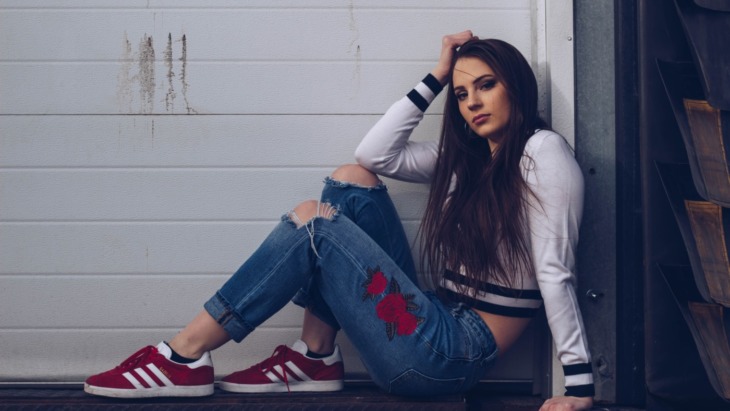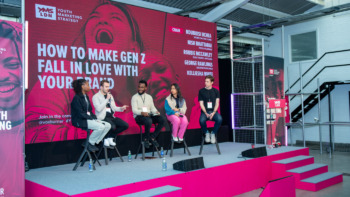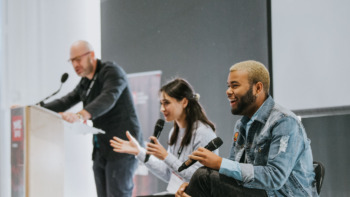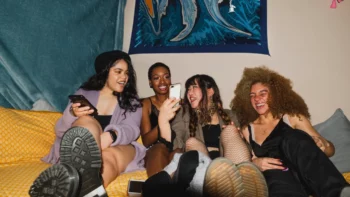Influencers started with millennials, but now a new group are entering the arena and they’re changing up the narrative. Without further ado, meet the next generation of influencers – Gen Z.
The term ‘influencer’ has come about only in the last few years. More recently, the concept has evolved into more than someone with a few thousand followers on social media. Today, with so many brands getting involved in social media activity to promote their products, being an influencer has become a way for people to earn a living; it is a new type of job prospect for Gen Zs considering their future careers.
As a diverse and ethically-conscious demographic, Gen Zs entering the influencer playground are already making waves – they’re changing up the narrative of an influencer and are aligning the job specification with their own views and values. For brands, tapping into the influencer world is a tactical Gen Z marketing move, but understanding the new landscape is a must in order to do it right.
#NoFilter
For Gen Zs, authenticity and transparency are a key component in the influencer world. No more do they buy into picture-perfect, blemish-free sponsored posts and insincere paid partnerships. Brand deals that align with their own habits, hobbies and interests, and content that speaks to their following by being real and genuine is much more likely to make an impact amongst the 16-24-year-old demographic.
Our sister company, Voxburner, recently caught up with two Gen Z students, both with an influential presence on Instagram, during YMS:Online. JoJo Watson, founder of Plussizemenmatter, and Anna Montez, The Makeup Girl, touched upon all of these topics, highlighting the impact that Gen Z are making in the online space.
“We have to be real,” comments JoJo. “On Instagram there used to be a highlight rule where you just show parts of your life and you just keep it moving. But now it’s become this place of social change with everyone just being very transparent and open.”
View this post on Instagram
Gen Zs are at the forefront of calling out the use of filters and photoshop. #Nofilter is now inundated with positive posts of real people, and relays the message that everyone should be their true, authentic selves. Celebrating authenticity and the “real” versions of themselves does still include makeup and beauty – but rather than using makeup to cover up perceived imperfections, Gen Zs have co-opted makeup as a way to be creative and artistic, and to express their identity. Gen Z are seamlessly blending the real world with the digital world – and in the real world, there’s no filters or photoshop. Brands have a role to play in aligning themselves with these views to build up consumer confidence.
Honesty is the best policy
Being authentic on social media is the first step to building trust with your audience – and Gen Z fully understand and value that concept. Indeed, authenticity is a key driver for young consumers, and they are drawn to brands that are keeping it real. This means that Gen Zs’ social media feeds are more likely to be refined and reflective of their ethics, interests and values, compared to older generations.
Micro-influencers, those with a smaller but still significant following, particularly appeal to Gen Z from an honesty and trust perspective. In our recent survey, we learnt that 46% of UK students think those with 5,000 to 20,000 followers are more trustworthy than those with a higher following. A similar sentiment is found among US students, 45% of which would agree.
“I can always tell when someone’s not being themself on social media – it’s quite obvious when someone is just doing something to please a certain group of people. You do have to come with a transparent approach and do things not only because it’s what you should be doing, but also because you want to do it.” – Anna Montez, The Makeup Girl
Over in Australia, we’ve learnt that 78% of Gen Z students follow influencers. Clearly the global Gen Z audience has an appetite for this type of activity, and are keen to make their mark. For brands, building a successful social media marketing strategy is a great way to engage with your next generation of consumers, however bare in mind the importance of being genuine and real online – otherwise Gen Z will see straight through you.
Changing for the better
Gen Z influencers are making it their mission to be proactive and get involved in conversations surrounding global issues. More recently, Black Lives Matter and issues surrounding gender equality, women’s safety and mental health have been heavily present on social feeds and stories.
View this post on Instagram
JoJo adds: “Now more than ever, we’re awake, we’re alive. We’re seeing all of the issues around the world coming onto our timelines and onto our newsfeeds, and everyone is really getting involved and taking a stand. I think last year was such a horrific year that everyone has just pulled together and have decided to make change through their own platforms.”
In support of Black Lives Matter, 69% of US students signed a petition, 67% posted on social media, and a further 30% made a donation – signs of a new era of online activism. UK students acted in a similar vein, with 74% signing a petition and 61% posting on social media. Overall, 86% have taken part in the movement – and the conversation is not stopping there. Gen Z influencers are at the forefront of keeping important conversations going – and brands need to do the same if they want to work collaboratively and build up a loyal student following.
Student Beans can put you directly in front of a global Gen Z audience – contact us today to find out more.














